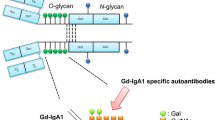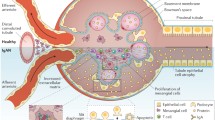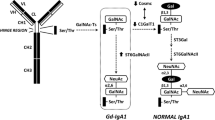Abstract
IgA nephropathy (IgAN) has variable clinical presentation and outcome. There is a need to identify children who have the potential to progress to end stage renal disease (ESRD). Biomarkers related to the pathogenetic process of IgAN can detect risk factors and identify targets for new therapies. Galactose-deficient IgA1 (Gd-IgA1) is a specific biomarker of IgAN and could be the first treatment target. In experimental mice, reduction of IgA1 deposits and hematuria was observed after treatment with a bacterial protease that selectively cleaves human IgA1. Glycan-targeted drugs that may act to neutralize Gd-IgA1 inhibit abnormal enzymatic glycosylation of IgA1 or deplete cells producing Gd-IgA1. The autoimmune response to Gd-IgA1 produces autoantibodies that are sensitive and specific biomarkers of IgAN development and progression and suggests the possible benefits of anti-B cell therapies directed against CD20, B-cell activating factor (BAFF), or B cell receptor, and also proteasome inhibitors. The activation of complement in IgAN offers new biomarkers and the rationale for using complement inhibitors, including eculizumab. Renal pathological features represent sensitive biomarkers of added value over clinical data and may drive steroid therapy in selected cases. Finally, the hypothesis of the involvement of intestinal mucosal immunity in the pathogenesis of IgAN suggests the possibility of avoiding the systemic effect of steroid. Enteric budesonide targeting Peyer’s patches at the ileocecal junction is an interesting option that has provided some preliminary favorable results in IgAN. In conclusion, the identification of new biomarkers is a promising area for therapies targeting IgAN in patients at risk of progression.


Similar content being viewed by others
References
Coppo R (2008) Pediatric IgA nephropathy: clinical and therapeutic perspectives. Semin Nephrol 28:18–26
Wyatt RJ, Julian BA (2013) IgA nephropathy. N Engl J Med 368:2402–2414
Shima Y, Nakanishi K, Hama T, Mukaiyama H, Togawa H, Sako M, Kaito H, Nozu K, Tanaka R, Iijima K, Yoshikawa N (2013) Spontaneous remission in children with IgA nephropathy. Pediatr Nephrol 28:71–76
Coppo R, Troyanov S, Camilla R, Hogg RJ, Cattran DC, Cook HT, Feehally J, Roberts IS, Amore A, Alpers CE, Barratt J, Berthoux F, Bonsib S, Bruijn JA, D’Agati V, D’Amico G, Emancipator SN, Emma F, Ferrario F, Fervenza FC, Florquin S, Fogo AB, Geddes CC, Groene HJ, Haas M, Herzenberg AM, Hill PA, Hsu SI, Jennette JC, Joh K, Julian BA, Kawamura T, Lai FM, Li LS, Li PK, Liu ZH, Mezzano S, Schena FP, Tomino Y, Walker PD, Wang H, Weening JJ, Yoshikawa N, Zhang H (2010) The Oxford IgA nephropathy clinicopathological classification is valid for children as well as adults. Kidney Int 77:921–927
Haas M, Rahman MH, Cohn RA (2008) IgA nephropathy in children and adults: comparison of histologic features and clinical outcomes. Nephrol Dial Transplant 23:2537–2545
Coppo R, Troyanov S, Bellur S, Cattran D, Cook HT, Feehally J, Roberts IS, Morando L, Camilla R, Tesar V, Lunberg S, Gesualdo L, Emma F, Rollino C, Amore A, Praga M, Feriozzi S, Segoloni G, Pani A, Cancarini G, Durlik M, Moggia E, Mazzucco G, Giannakakis C, Honsova E, Sundelin BB, Di Palma AM, Ferrario F, Gutierrez E, Asunis AM, Barratt J, Tardanico R, Perkowska-Ptasinska A; VALIGA study of the ERA-EDTA Immunonephrology Working Group (2014) Validation of the Oxford classification of IgA nephropathy in cohorts with different presentations and treatments. Kidney Int 86:828–836
Ronkainen J, Ala-Houhala M, Autio-Harmainen H, Jahnukainen T, Koskimies O, Merenmies J, Mustonen J, Ormälä T, Turtinen J, Nuutinen M (2006) Long-term outcome 19 years after childhood IgA nephritis: a retrospective cohort study. Pediatr Nephrol 21:1266–1273
Hastings MC, Delos Santos NM, Wyatt RJ (2007) Renal survival in pediatric patients with IgA nephropathy. Pediatr Nephrol 22:317–318
Fassbinder W, Brunner FP, Brynger H, Ehrich JH, Geerlings W, Raine AE, Rizzoni G, Selwood NH, Tufveson G, Wing AJ (1991) Combined report on regular dialysis and transplantation in Europe, XX, 1989. Nephrol Dial Transplant 6 [Suppl 1]:5–35
Hastings MC, Moldoveanu Z, Suzuki H, Berthoux F, Julian BA, Sanders JT, Renfrow MB, Novak J, Wyatt RJ (2013) Biomarkers in IgA nephropathy: relationship to pathogenetic hits. Exp Opin Med Diagn 7:615–627
Hwang VJ, Ulu A, van Hoorebeke J, Weiss RH (2014) Biomarkers in IgA nephropathy. Biomark Med 8:1263–1277
Moresco RN, Speeckaert MM, Delanghe JR (2015) Diagnosis and monitoring of IgA nephropathy: the role of biomarkers as an alternative to renal biopsy. Autoimmun Rev 14:847–853
Suzuki H, Kiryluk K, Novak J, Moldoveanu Z, Herr AB, Renfrow MB, Wyatt RJ, Scolari F, Mestecky J, Gharavi AG, Julian BA (2011) The pathophysiology of IgA nephropathy. J Am Soc Nephrol 22:1795–1803
Moldoveanu Z, Wyatt RJ, Lee JY, Tomana M, Julian BA, Mestecky J, Huang WQ, Anreddy SR, Hall S, Hastings MC, Lau KK, Cook WJ, Novak J (2007) Patients with IgA nephropathy have increased serum galactose-deficient IgA1 levels. Kidney Int 71:1148–1154
Hastings MC, Afshan S, Sanders JT, Kane O, Eison TM, Lau KK, Moldoveanu Z, Julian BA, Novak J, Wyatt RJ (2012) Serum galactose-deficient IgA1 level is not associated with proteinuria in children with IgA nephropathy. Int J Nephrol 2012:315467
Yanagawa H, Suzuki H, Suzuki Y, Kiryluk K, Gharavi AG, Matsuoka K, Makita Y, Julian BA, Novak J, Tomino Y (2014) A panel of serum biomarkers differentiates IgA nephropathy from other renal diseases. PLoS One 23(9):e98081
Coppo R (2015) A new monoclonal antibody for detecting degalactosylated IgA1 as serum biomarker of IgA nephropathy. Nephrol Dial Transplant 30:1234–1236
Yasutake J, Suzuki Y, Suzuki H, Hiura N, Yanagawa H, Makita Y, Kaneko E, Tomino Y (2015) Novel lectin-independent approach to detect galactose-deficient IgA1 inIgA nephropathy. Nephrol Dial Transplant 30:1315–1321
Coppo R, Peruzzi L, Amore A, Piccoli A, Cochat P, Stone R, Kirschstein M, Linné T (2007) IgACE: a placebo-controlled, randomized trial of angiotensin-converting enzyme inhibitors in children and young people with IgA nephropathy and moderate proteinuria. J Am Soc Nephrol 18:1880–1888
Gharavi AG, Moldoveanu Z, Wyatt RJ, Barker CV, Woodford SY, Lifton RP, Mestecky J, Novak J, Julian BA (2008) Aberrant IgA1 glycosylation is inherited in familial and sporadic IgA nephropathy. J Am Soc Nephrol 19:1008–1014
Berthelot L, Robert T, Vuiblet V, Tabary T, Braconnier A, Dramé M, Toupance O, Rieu P, Monteiro RC, Touré F (2015) Recurrent IgA nephropathy is predicted by altered glycosylated IgA, autoantibodies and soluble CD89 complexes. Kidney Int 88:815–822
Camilla R, Suzuki H, Daprà V, Loiacono E, Peruzzi L, Amore A, Ghiggeri GM, Mazzucco G, Scolari F, Gharavi AG, Appel GB, Troyanov S, Novak J, Julian BA, Coppo R (2011) Oxidative stress and galactose-deficient IgA1 as markers of progression in IgA nephropathy. Clin J Am Soc Nephrol 6:1903–1911
Lechner SM, Papista C, Chemouny JM, Berthelot L, Monteiro RC (2016) Role of IgA receptors in the pathogenesis of IgA nephropathy. J Nephrol 29:5–11
Hiki Y, Ito A, Yamamoto Y, Yamamoto K, Iwase H (2011) IgA nephropathy and aberrant glycosylation of tonsillar, serum and glomerular IgA1. Adv Otorhinolaryngol 72:68–70
Lamm ME, Emancipator SN, Robinson JK, Yamashita M, Fujioka H, Qiu J, Plaut AG (2008) Microbial IgA protease removes IgA immune complexes from mouse glomeruli in vivo: potential therapy for IgA nephropathy. Am J Pathol 172:31–36
Xie LS, Huang J, Qin W, Fan JM (2010) Immunoglobulin A1 protease: a new therapeutic candidate for immunoglobulin a nephropathy. Nephrology (Carlton) 15:584–586
Lechner SM, Abbad L, Boedec E, Papista C, Le Stang MB, Moal C, Maillard J, Jamin A, Bex-Coudrat J, Wang Y, Li A, Martini PG, Monteiro RC, Berthelot L (2016) IgA1 protease treatment reverses mesangial deposits and hematuria in a model of IgA nephropathy. J Am Soc Nephrol. doi:10.1681/ASN.2015080856
Suzuki Y, Suzuki H, Yasutake J, Tomino Y (2015) Paradigm shift in activity assessment of IgA nephropathy - optimizing the next generation of diagnostic and therapeutic maneuvers via glycan targeting. Expert Opin Biol Ther 15:583–593
Suzuki H, Fan R, Zhang Z, Brown R, Hall S, Julian BA, Chatham WW, Suzuki Y, Wyatt RJ, Moldoveanu Z, Lee JY, Robinson J, Tomana M, Tomino Y, Mestecky J, Novak J (2009) Aberrantly glycosylated IgA1 in IgA nephropathy patients is recognized by IgG antibodies with restricted heterogeneity. J Clin Invest 119:1668–1677
Berthoux F, Suzuki H, Thibaudin L, Yanagawa H, Maillard N, Mariat C, Tomino Y, Julian BA, Novak J (2012) Autoantibodies targeting galactose-deficient IgA1 associate with progression of IgA nephropathy. J Am Soc Nephrol 23:1579–1587
Blüml S, McKeever K, Ettinger R, Smolen J, Herbst R (2013) B-cell targeted therapeutics in clinical development. Arthritis Res Ther 15(1):S4
Xin G, Shi W, Xu LX, Su Y, Yan LJ, Li KS (2013) Serum BAFF is elevated in patients with IgA nephropathy and associated with clinical and histopathological features. J Nephrol 26:683–690
McCarthy DD, Kujawa J, Wilson C, Papandile A, Poreci U, Porfilio EA, Ward L, Lawson MA, Macpherson AJ, McCoy KD, Pei Y, Novak L, Lee JY, Julian BA, Novak J, Ranger A, Gommerman JL, Browning JL (2012) Mice overexpressing BAFF develop a commensal flora-dependent, IgA-associated nephropathy. J Clin Invest 121:3991–4002
Coppo R, Camilla R, Alfarano A, Balegno S, Mancuso D, Peruzzi L, Amore A, Dal Canton A, Sepe V, Tovo P (2009) Upregulation of the immunoproteasome in peripheral blood mononuclear cells of patients with IgA nephropathy. Kidney Int 75:536–541
Gharavi AG, Kiryluk K, Choi M, Li Y, Hou P, Xie J, Sanna-Cherchi S, Men CJ, Julian BA, Wyatt RJ, Novak J, He JC, Wang H, Lv J, Zhu L, Wang W, Wang Z, Yasuno K, Gunel M, Mane S, Umlauf S, Tikhonova I, Beerman I, Savoldi S, Magistroni R, Ghiggeri GM, Bodria M, Lugani F, Ravani P, Ponticelli C, Allegri L, Boscutti G, Frasca G, Amore A, Peruzzi L, Coppo R, Izzi C, Viola BF, Prati E, Salvadori M, Mignani R, Gesualdo L, Bertinetto F, Mesiano P, Amoroso A, Scolari F, Chen N, Zhang H, Lifton RP (2011) Genome-wide association study identifies susceptibility loci for IgA nephropathy. Nat Genet 43:321–327
Wei B, Pei G (2010) microRNAs: critical regulators in Th17 cells and players in diseases. Cell Mol Immunol 7:175–181
Schena FP, Serino G, Sallustio F (2014) MicroRNAs in kidney diseases: new promising biomarkers for diagnosis and monitoring. Nephrol Dial Transplant 29:755–763
Serino G, Sallustio F, Curci C, Cox SN, Pesce F, De Palma G, Schena FP (2015) Role of let-7b in the regulation of N-acetylgalactosaminyltransferase 2 in IgA nephropathy. Nephrol Dial Transplant 30:1132–1139
Serino G, Pesce F, Sallustio F, De Palma G, Cox SN, Curci C, Zaza G, Lai KN, Leung JC, Tang SC, Papagianni A, Stangou M, Goumenos D, Gerolymos M, Takahashi K, Yuzawa Y, Maruyama S, Imai E, Schena FP (2015) In a retrospective international study, circulating miR-148b and let-7b were found to be serum markers for detecting primary IgA nephropathy. Kidney Int. 89(3):683–692
Schena FP, Sallustio F, Serino G (2015) microRNAs in glomerular diseases from pathophysiology to potential treatment target. Clin Sci (Lond) 128:775–788
Kalantari S, Rutishauser D, Samavat S, Nafar M, Mahmudieh L, Rezaei-Tavirani M, Zubarev RA (2013) Urinary prognostic biomarkers and classification of IgA nephropathy by high resolution mass spectrometry coupled with liquid chromatography. PLoS One 8:e80830
Maillard N, Wyatt RJ, Julian BA, Kiryluk K, Gharavi A, Fremeaux-Bacchi V, Novak J (2015) Current understanding of the role of complement in IgA nephropathy. J Am Soc Nephrol 26:1503–1512
Daha MR, van Kooten C (2016) Role of complement in IgA nephropathy. J Nephrol 29:1–4
Espinosa M, Ortega R, Sánchez M, Segarra A, Salcedo MT, González F, Camacho R, Valdivia MA, Cabrera R, López K, Pinedo F, Gutierrez E, Valera A, Leon M, Cobo MA, Rodriguez R, Ballarín J, Arce Y, García B, Muñoz MD, Praga M (2014) Spanish group for study of glomerular diseases (GLOSEN). association of C4d deposition with clinical outcomes in IgA nephropathy. Clin J Am Soc Nephrol 9:897–904
Schmitt R, Ståhl AL, Olin AI, Kristoffersson AC, Rebetz J, Novak J, Lindahl G, Karpman D (2014) The combined role of galactose-deficient IgA1 and streptococcal IgA-binding M Protein in inducing IL-6 and C3 secretion from human mesangial cells: implications for IgA nephropathy. J Immunol 193:317–326
Kiryluk K, Li Y, Scolari F, Sanna-Cherchi S, Choi M, Verbitsky M, Fasel D, Lata S, Prakash S, Shapiro S, Fischman C, Snyder HJ, Appel G, Izzi C, Viola BF, Dallera N, Del Vecchio L, Barlassina C, Salvi E, Bertinetto FE, Amoroso A, Savoldi S, Rocchietti M, Amore A, Peruzzi L, Coppo R, Salvadori M, Ravani P, Magistroni R, Ghiggeri GM, Caridi G, Bodria M, Lugani F, Allegri L, Delsante M, Maiorana M, Magnano A, Frasca G, Boer E, Boscutti G, Ponticelli C, Mignani R, Marcantoni C, Di Landro D, Santoro D, Pani A, Polci R, Feriozzi S, Chicca S, Galliani M, Gigante M, Gesualdo L, Zamboli P, Battaglia GG, Garozzo M, Maixnerová D, Tesar V, Eitner F, Rauen T, Floege J, Kovacs T, Nagy J, Mucha K, Pączek L, Zaniew M, Mizerska-Wasiak M, Roszkowska-Blaim M, Pawlaczyk K, Gale D, Barratt J, Thibaudin L, Berthoux F, Canaud G, Boland A, Metzger M, Panzer U, Suzuki H, Goto S, Narita I, Caliskan Y, Xie J, Hou P, Chen N, Zhang H, Wyatt RJ, Novak J, Julian BA, Feehally J, Stengel B, Cusi D, Lifton RP, Gharavi AG (2014) Discovery of new risk loci for IgA nephropathy implicates genes involved in immunity against intestinal pathogens. Nat Genet 46:1187–1196
Rosenblad T, Rebetz J, Johansson M, Békássy Z, Sartz L, Karpman D (2014) Eculizumab treatment for rescue of renal function in IgA nephropathy. Pediatr Nephrol 29:2225–2228
Ring T, Pedersen BB, Salkus G, Goodship TH (2015) Use of eculizumab in crescentic IgA nephropathy: proof of principle and conundrum? Clin Kidney J 8:489–491
Rojas-Rivera J, Fernández-Juárez G, Praga M (2015) Rapidly progressive IgA nephropathy: a form of vasculitis or a complement-mediated disease? Clin Kidney J 8:477–481
Coppo R, D’Amico G (2005) Factors predicting progression of IgA nephropathies. J Nephrol 18:503–512
Bartosik LP, Lajoie G, Sugar L, Cattran DC (2001) Predicting progression in IgA nephropathy. Am J Kidney Dis 38:728–735
Reich HN, Troyanov S, Scholey JW, Cattran DC, Registry TG (2007) Remission of proteinuria improves prognosis in IgA nephropathy. J Am Soc Nephrol 18:3177–3183
Cattran DC, Coppo R, Cook HT, Feehally J, Roberts IS, Troyanov S, Alpers CE, Amore A, Barratt J, Berthoux F, Bonsib S, Bruijn JA, D’Agati V, D’Amico G, Emancipator S, Emma F, Ferrario F, Fervenza FC, Florquin S, Fogo A, Geddes CC, Groene HJ, Haas M, Herzenberg AM, Hill PA, Hogg RJ, Hsu SI, Jennette JC, Joh K, Julian BA, Kawamura T, Lai FM, Leung CB, Li LS, Li PK, Liu ZH, Mackinnon B, Mezzano S, Schena FP, Tomino Y, Walker PD, Wang H, Weening JJ, Yoshikawa N, Zhang H (2009) The Oxford classification of IgA nephropathy: rationale, clinicopathological correlations, and classification. Kidney Int 76:534–545
Tesar V, Troyanov S, Bellur S, Verhave JC, Cook HT, Feehally J, Roberts IS, Cattran D, Coppo R, VALIGA study of the ERA-EDTA Immunonephrology Working Group (2015) Corticosteroids in IgA nephropathy: a retrospective analysis from the VALIGA study. J Am Soc Nephrol 26:2248–2258
Barbour SJ, Espino-Hernandez G, Reich HN, Coppo R, Roberts IS, Feehally J, Herzenberg AM, Cattran DC; VALIGA; Oxford Derivation and North American Validation (2016) The MEST score provides earlier risk prediction in IgA nephropathy. Kidney Int 89:167–175
Coppo R (2014) The intestine-renal connection in IgA nephropathy. Nephrol Dial Transplant 30:360–366
Smerud HK, Bárány P, Lindström K, Fernström A, Sandell A, Påhlsson P, Fellström B (2011) New treatment for IgA nephropathy: enteric budesonide targeted to the ileocecal region ameliorates proteinuria. Nephrol Dial Transplant 26:3237–3242
Lebreton C, Ménard S, Abed J, Moura IC, Coppo R, Dugave C, Monteiro RC, Fricot A, Traore MG, Griffin M, Cellier C, Malamut G, Cerf-Bensussan N, Heyman M (2012) Interactions among secretory immunoglobulin A, CD71, and transglutaminase-2 affect permeability of intestinal epithelial cells to gliadin peptides. Gastroenterology 143:698–707
Author information
Authors and Affiliations
Corresponding author
Ethics declarations
Conflicts of interest
The author declares that there are no conflicts of interest.
Rights and permissions
About this article
Cite this article
Coppo, R. Biomarkers and targeted new therapies for IgA nephropathy. Pediatr Nephrol 32, 725–731 (2017). https://doi.org/10.1007/s00467-016-3390-9
Received:
Revised:
Accepted:
Published:
Issue Date:
DOI: https://doi.org/10.1007/s00467-016-3390-9




